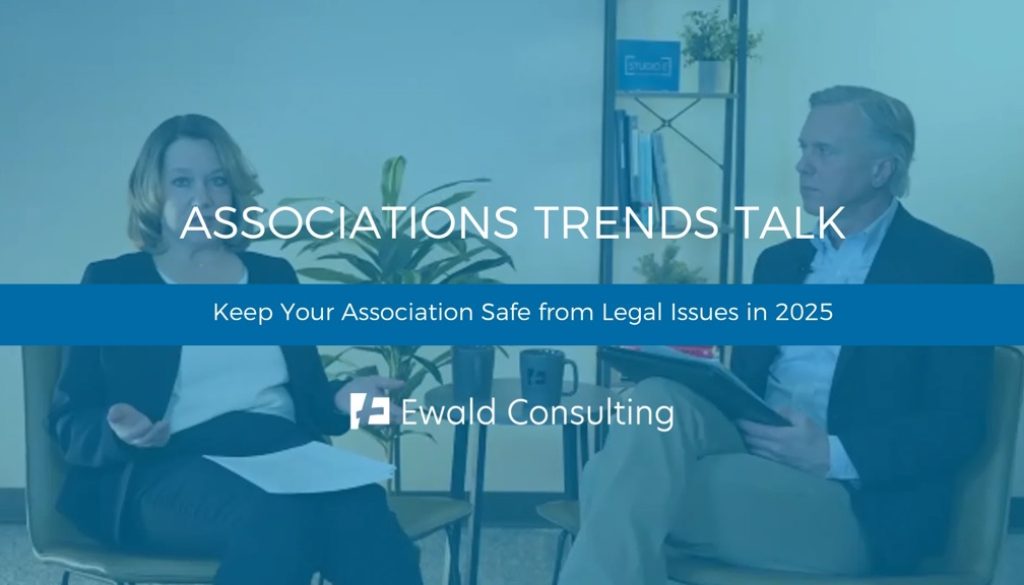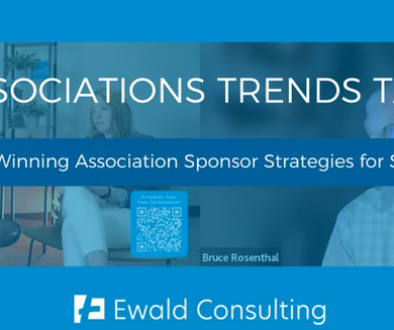Associations Trends Talk Takeaways: Keep Your Association Safe from Legal Issues
Attorney Heidi Christianson of Nilan Johnson Lewis joined Ewald Consulting Chief Client Experience Officer Eric Ewald on January 14 for an insightful discussion on legal trends that are affecting associations. Here are five leading issues Heidi identified that association leaders should watch out for:
Strategic Alliances between Trade Associations
Strategic alliances can be as simple as a one-time agreement to share services (perhaps to present a joint conference or a marketing trade-out to expand reach) or much more complex. For instance, an association could offer reciprocity for event attendance or membership with other associations. It can provide a benefit for sponsors. And Heidi has worked on a number of mergers or formal arrangements that are more permanent.
In the case of a merger between two associations, it allows one employer to operate both organizations while allowing both organizations to keep their corporate structure. That kind of merger provides for efficiencies in staffing and completing documents like 1099s and 990s. Heidi noted that the concept of a merger always seems simpler than the execution. The dissolution of a shared services agreement can also be surprisingly complex. If your organization is considering setting up or dissolving a strategic alliance, Heidi suggests setting up a subcommittee with representatives from both organizations. Expect it to take about a year to complete an agreement.
It’s vital to pay attention to unrelated business income tax (UBIT) implications. Heidi recommended using your organization’s Form 990 (Part III, line 2) to explain how the new activity supports the mission of the association. If you do that in the tax year when the activity begins, the IRS will have a record. This can avoid many more questions from the IRS should your association happen to be audited.
Agreements Presented to an Association by Sponsors or Partners Wanting to Sell Goods or Services
Heidi says that if your organization receives a proposal from a sponsor or partner to sell goods or services, you need to parse through the offer very carefully. These contracts have become increasingly complex, and you should be sure the requests from partners are in alignment with association policies. Some recent requests have included an ex officio seat on the association board or member data.
If the income from such a proposal is related to the association’s mission, it won’t be subject to UBIT. However, advertising can be subject to UBIT. It can be hard to figure out what is and is not taxable. If the sponsor is agreeing to share a portion of revenue, that is a classic UBIT situation. An attorney can help you advise you in setting up sponsorship agreements, including how to categorize income. “It’s really important for you and your CPA to be on the same page regarding sponsorships,” Heidi says. She also notes that agreements between a tax-exempt entity and a for-profit entity cannot benefit the for-profit entity more than the nonprofit.
Heidi stressed the need to be vigilant about what your association is willing to provide to a partner/sponsor; you want to protect your intellectual property and your members’ data. A non-disclosure agreement (NDA) is good practice. Eric noted that sources of non-dues revenue are essential to an association’s success so the organization isn’t too dependent on any one source of revenue. In the past, it was more common to simply have sponsors for a conference or major event — but now, associations often offer a yearlong, customized bundle of benefits to sponsors and partners. Talk to your attorney or CPA if you have questions about setting up partnerships.
Member Issues
Heidi says her firm received several questions about Americans with Disabilities Act (ADA) accommodations at conferences. Generally, associations want to meet the needs of attendees, but it’s helpful for the association to know about these requests well in advance of the event. When you start promoting a new event, include a request for ADA accommodations in the registration. In some cases, an accommodation is required by law.
Other member issues include challenges to certification programs, breach of confidentiality claims, and use of a member’s IP address by another member. In many situations such as these, it’s helpful to regularly provide members with reminders of association policies. An attestation of agreement for the organization’s code of contact is useful.
Advice for Board Members in the New Year
Board members are volunteers with other full-time jobs who are multitasking. To interact successfully, Heidi suggests that you need to remind them about key responsibilities and what their focus should be. Association strategy is one key responsibility for board members.
Eric reported that the pandemic had an impact on volunteerism, with a 7% drop from 2019 to 2021 in the U.S. The reasons for the drop include people not having time or money to volunteer. Many of us face the challenge of attracting/recruiting good volunteers. A one-to-one interaction is more important than ever to recruit leaders for committees and boards.
AI Note-Takers
Association leaders have seen a proliferation of AI note-takers at association meetings. When your meeting agenda includes a sensitive topic that could result in a legal issue, all AI note-takers should be turned off. Heidi said AI-generated notes should not be used as the official record of the meeting; AI often attributes statements to the wrong person or makes other errors. Meeting minutes should include general discussion, not who said what. Board members/staff should destroy any notes once the minutes are distributed. Your association should have just one official record for each meeting.
Watch the video of this webinar for more details.
Sign up here to make sure you receive future announcements about upcoming Associations Trends Talks.



